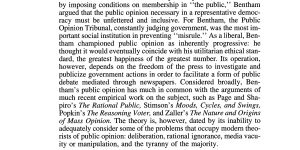My paper, one of the few political theory studies published in the leading journal on public opinion studies, showed that Bentham should be recognized as the first true theorist of the role of public opinion in the kind of liberal democracy that prevails today.
https://academic.oup.com/poq/article/63/3/321/1902496
Abstract
Well-known as the father of utilitarian philosophy, Jeremy Bentham is less well-known as a pioneer theorist of public opinion. His work on the subject in the early 19th century was the first to tolerate the indeterminacy of public opinion in a liberal democracy. Where previous theorists had tried to specify the content of a true public opinion, and most did so by imposing conditions on membership in ‘the public’, Bentham argued that the public opinion necessary in a representative liberal democracy must be unfettered and inclusive. Its operation, however, depends on the freedom of the press to investigate and publicize government actions. As a progressive entity, what he called the “Public Opinion Tribunal” will, over time, eventually coincide perfectly with his ethical standard: the greatest happiness of the greatest number, or the “universal interest”. Considered broadly, Bentham’s public opinion has much in common with the normative implications of much recent work on the subject, such as Page and Shapiro’s The Rational Public, Stimson’s Moods, Cycles, and Swings, Popkin’s The Reasoning Voter, and Zaller’s The Nature and Origins of Mass Opinion. The theory is, however, dated by its inability to consider some of the problems that occupy modern theorists of public opinion: deliberation, rational ignorance, manipulation, and the tyranny of the majority.

With this paper I cut my academic publishing teeth. I learned a bit about when a paper is ready for submission to a journal, how you use colleagues for feedback, and how to do revisions for a resubmission. I'm sure this publication helped me stand out from most political behaviour scholars.